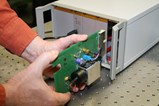High Bit Rate Quantum Random Number Generator Service Started

The generator developed by PicoQuant GmbH and the Nano-Optics groups at the Department of Physics of Humboldt University delivers random numbers over the internet
PicoQuant GmbH and the Nano-Optics groups at the Department of Physics of Humboldt University, Berlin have started a Quantum Random Number Generator (QRNG) that is based on the quantum randomness of photon arrival times. It provides a bit rate with up to 150 Mbits/s over USB. Interested persons are invited to test and use the generated randomness on the website of the Humboldt University at http://qrng.physik.hu-berlin.de. The service is free of charge but requires registration.
Users can download single chunks of random bits via the Web. Continuous streams of random data can be fed directly into custom application software by means of DLLs for access to the server. None of the served data is delivered more than once, neither to a single user nor across independent users.
The design of the QRNG creates a new quality in the sense that it offers substantially higher bit rates than previous solutions available to the public. This has become possible by exploiting most recent photon timing instrumentation and state-of-the-art data processing in hardware. In addition to providing high speed, the post-processing algorithm applied to the raw data is based on solid predictions from information theory which guarantee conservation of randomness. This allows for the use of the delivered random numbers in unconditionally secure encryption schemes.
Randomness is an invaluable resource in many areas of science and technology. Especially Monte Carlo simulations and secure encryption methods heavily rely on it. While computer generated random numbers can be used for some applications, they remain fundamentally nonrandom in the sense that anything generated by an algorithm is predictable and hence not suitable for e.g. secure data encryption. Similarly, the inherent flaws of algorithmically generated (pseudo-) randomness have often caused obscure errors in Monte Carlo simulations. It has therefore been a goal of research and development worldwide to obtain truly random numbers from unpredictable physical processes. The single most qualified class of such sources of randomness stems from quantum indeterminism. While the quantum nature of radioactivity was already used for random number generation many years ago, it has obvious drawbacks in terms of practical usability.
An accessible and convenient source of quantum randomness is ubiquitously available in the form of single photons. Several photon based random number generators utilizing quantum indeterminism have been proposed and realized in the recent past. However, with respect to commercial availability, not many implementations are reliable and/or cost efficient enough for routine use outside the physics laboratory. Probably the additional requirements of proven and long term statistical quality, speed and affordability have narrowed the choice of real-world solutions down quite considerably. The new QRNG service that PicoQuant and the Humboldt University have now developed in the context of the BMBF-project KEPHOSI attempts to fill some of this gap.
About PicoQuant
PicoQuant GmbH is a research and development company in the field of optoelectronics. The company was founded in 1996 and is based in the science and technology park Berlin-Adlershof, Germany. The company is a worldwide leader in the field of single photon counting applications. The product line includes pulsed diode lasers and LEDs, photon counting instrumentation, fluorescence lifetime spectrometers and time-resolved confocal microscopes. PicoQuant employs currently around 50 people. Since April 2008 Sales and Support in North America is handled by PicoQuant Photonics North America Inc.
SOURCE: PicoQuant GmbH and The Nano-Optics groups
